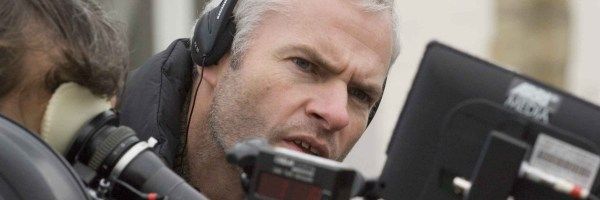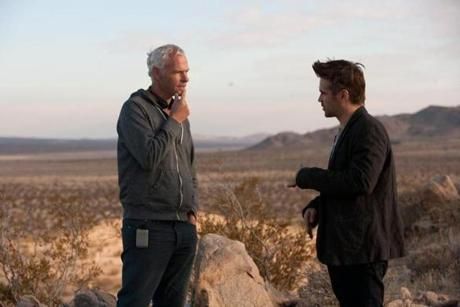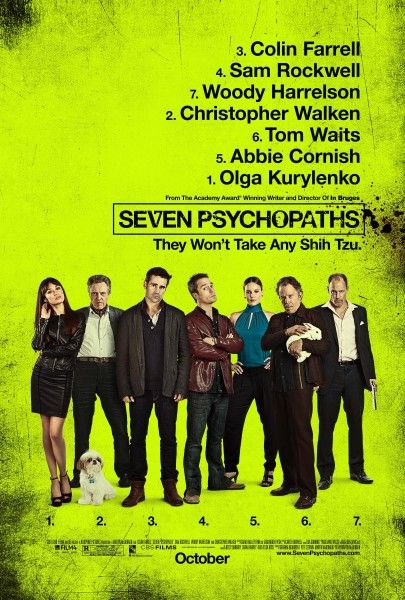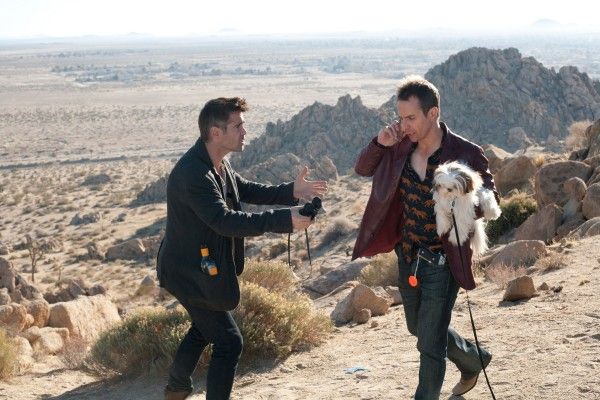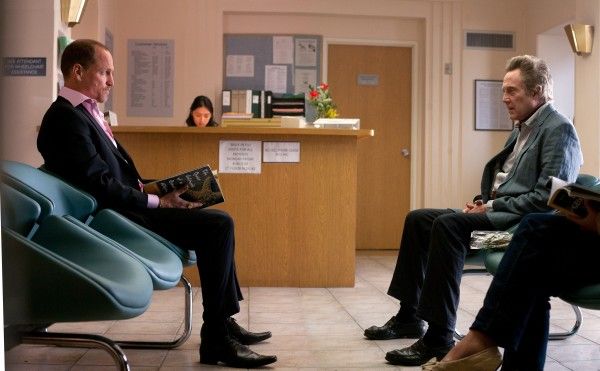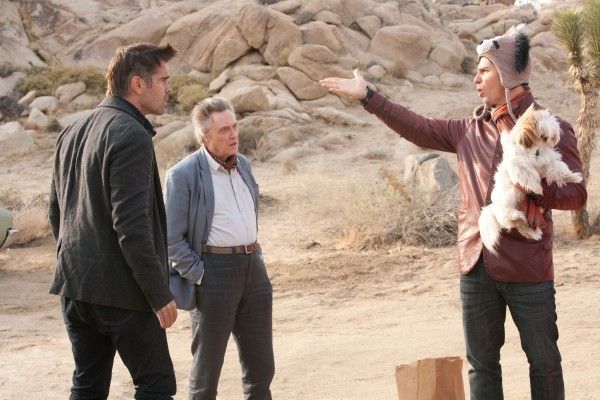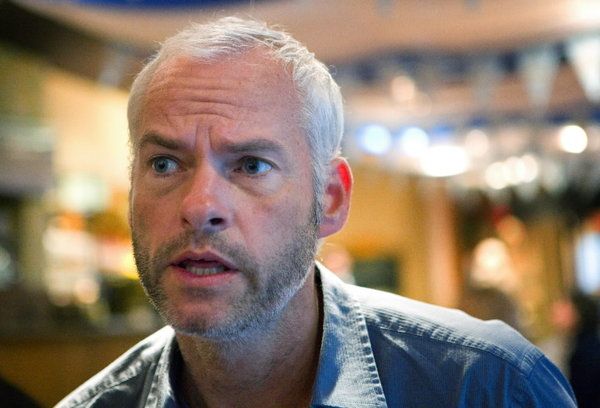The crime comedy Seven Psychopaths, from writer/director Martin McDonagh (In Bruges), is equal parts gore and humor, with an absolutely adorable Shih Tzu thrown in, for good measure. Struggling screenwriter Marty Faranan (Colin Farrell) is past deadline and out of ideas, until he gets inspiration from his best friend Billy (Sam Rockwell) and the eccentric Hans (Christopher Walken), whose dog-napping business results in gangster Charlie Costello (Woody Harrelson) desperate to get his prized pooch back.
At the film’s press day, Martin McDonagh talked about the meta aspects of the film, the importance of injecting the humor into this story, how lovely Bonny the Shih Tzu was to work with, why he chose to shoot on film versus digital, what the actors brought to their unusual roles, and the fact that he could never see himself directing someone else’s work. Check out what he had to say after the jump.
Question: What is the attraction to psychopaths, killers and rabbits?
MARTIN McDONAGH: Rabbits are a definite one. I love them. Psychopaths and killers, not so much. I guess I share Colin Farrell’s character’s feelings towards psychopaths and killers, in the film. I know how cinematic they are and how interesting films can be with them, but I question the morality of only having films about guys with guns. It’s playing those two ideas off each other that is my interest in them. Also, if I’d written a film called Seven Accountants, I wouldn’t really get much interest. Christopher Walken wouldn’t be the same in that part.
This movie operates on so many different meta levels. Was this the story you set out to write, from the beginning?
McDONAGH: Yeah, this is exactly how it developed. I think I had the Quakers Psychopath short story, and then I had the title of this. And then, I was stuck, like Colin’s character, and didn’t know how to come up with the others. I wanted it to be about love and peace, and then his two friends show up and the dog thing just snowballed. It developed naturally, like that, and then the meta things came. If you’re writing a film that’s about a writer in Hollywood who doesn’t want to write a film called Seven Psychopaths, it’s going to be meta, no matter what you do.
You’ve worked with Colin Farrell before. How much of the cast did you have in your head, as you were writing this?
McDONAGH: As I was writing, none of them, really. It was actually written seven years ago, just after I wrote the script for In Bruges, but before I made the film. I’ve loved all the actors in this, since a long time ago. Sometimes I write with Sam Rockwell’s voice in my head because I love him, as an actor, and I love the way that he can go from comedy to darkness, on a dime. But, I never dreamed I’d be in a place where I would be doing a film with Christopher Walken or Tom Waits or Harry Dean Stanton. I did a play with Sam and Christopher, about 3 years ago in New York, so I knew them. I met Woody [Harrelson] 10 years ago because he’s a theater guy, too. We almost did a play together. Tom Waits and I almost wrote a fucked up musical thing, which we might go back to. So, the first day of shooting was like a family. It wasn’t as terrifying as working with a cast this big might appear to be. It was fun, every day, on set. It’s palpable, in the film, how much fun we were all having. There were no issues from anyone.
As a writer, when you have Christopher Walken saying the words you wrote, with the interesting cadence that he delivers his lines, are you constantly surprised?
McDONAGH: It’s the periods and the commas that you have to forget about. But, he memorizes the script, word-for-word, six months beforehand. The words never change, but the intonations change. You can never imagine that a line or a word could be pronounced, in that way, but it’s still the words you wrote. So, there’s a joy and a surprise to all that stuff. After this and the play that we did, I can’t imagine any other way to say those lines. He’s really the only one in the world that can do that, I think.
Does he do that intentionally, or is that just how he pronounces things?
McDONAGH: You’d have to ask him. I don’t think so, though. I think he knows how screwed up that stuff is. How can he not? If it was an accidental thing, I think it would be different, on each take, and it’s not. It’s always deliberately wrong, on each take. But, I’ve learned the trick. The next time I want him to ask a question, I won’t put a question mark there because he’s going to do the opposite of everything. If I don’t want it to be a question, I’ll put a question mark there.
There’s quite a lot of humor throughout this. How important was it for you to interject those beats of humor?
McDONAGH: Very much. I think most of my work is that way. In Bruges was probably more sad and melancholic than this, but it’s still hopefully very funny throughout. This was always a black comedy, on the page, but I think it’s come out as more outrageously funny because of the actors. It’s the way that I think about the world, and the way that I like to tell stories. I don’t think you should get too heavy. There’s enough out there, in the world, with violence. I think that comedy lightens the heaviness when talking about those topics. It doesn’t feel like you’re preaching, if you can say something in a joke, which is where this film is coming from.
Working with animals always presents a challenge. How was it to work with Bonny?
McDONAGH: The animals were, honestly, a dream. Bonny, the dog, was lovely. She was quiet as a mouse. It was like she was on marijuana, or something. Kidding! And the rabbits were great.
Why did you decide to shoot on film and not go digital?
McDONAGH: I’m old school. I just think it looks better. I don’t think digital really speeds things up, and I definitely don’t think it looks better. I don’t think it’s cheaper yet, when you add in all of the extras that you need.
Was the gag with Christopher Walken coming out of the coffin in the script, or was that something you did on set?
McDONAGH: It was a vague thing in the script, but when I was storyboarding it, I thought, “That would be a good idea.” We didn’t tell Christopher about it, until that night, and I was dreading it. We built the coffin, it was like one in the morning and I was hoping he thought it was okay. We had the stuntman show him that it was completely safe and said, “Chris, do you think you could do this?,” and he said, “Yeah, cool!” We did it in one take. He had to come up, and the squibs went off, perfectly. It was one of the most joyful bits. We showed it back to him at the monitor and he just smiled when he saw how cool he looked. It’s one of my favorite images from the film.
With such eccentric characters, how much did the actual actors bring to their roles?
McDONAGH: Woody eating the strawberries was Woody, on the day. And the tattoo on his neck was Woody. He was trying to get some big funny teeth as well, but we thought that was going a little too far. He did, too, once he saw them. It made it a little too comic. We all stuck exactly to the script, but they’re all great actors, so they brought their brilliance to every part. Tom Waits’ costume was all his idea. He felt that his character had been home for years, and that this was like his job interview. He was dressed up quite nicely, but it just wasn’t fitting well enough. Sam and Colin and I drove out to Joshua Tree to spend the weekend getting to know each other, reading the script and bonding a little bit. Colin was driving and he popped into a gas station and got a bunch of crappy food, and bought the hat the Sam wears. He said he was kicking himself afterwards, when he saw it in the film because the hat is a scene stealer.
Do you feel like you got to do things in this that, in any other movie, would have been really absurd?
McDONAGH: Well, especially in the cemetery shootout. We just went crazy. You couldn’t be too big. When what happens to Woody’s character happens, that could be as gory and crazy and gratuitous and barking mad as you wanted it to be, but the rest of the film couldn’t be like that. I guess Tom Waits’ backstory is quite dark, bloody and graphic, in some ways. Hopefully, it’s not gratuitous, but it’s graphic. It’s still more truthful and more about how horrible violence is than the cemetery shoot-out, which is more about how cinema treats violence without being wordy or heavy. But, even in the comedy scenes, we had to just play it for truth rather than trying to make people laugh, or trying to be funny. If you set the characters up to be out there, it’s more fun to bring it down and play it truthful because what they’re doing is outrageous and comic, anyway. If you play the truth of that, there shouldn’t be a disparity when you get to the darker, more serious scenes.
After In Bruges got such a great critical reception, was there a degree of pressure on you, following that up?
McDONAGH: No. I’m really lazy, so after Bruges, I just went off and traveled. I wrote a play that we did it in New York, which is where I got to work with Sam and Christopher, the first time. I remember saying to Colin, “It’s going to be three years, at least, before the next film.” He believed me, but his people were like, “But, this is a success. Why would you do that?” It’s going to be the same after this one, too. I’m just going to travel and write and grow up. It doesn’t feel like four years since the last one. I think it’s more so that I won’t get burned out. This was an enjoyable experience to do. I can’t imagine doing them back-to-back because it’s been two solid years, working on this. It was exactly a year ago, this month, that we started shooting, and the editing has been almost every day, since then. It’s not hard work, like a coal miner or a nurse or something, but it’s concerted work, and I don’t like concerted work. I’ve got a script that’s ready to go, for the next one. I just know it won’t be for a while, but I’m fine with that.
Will you direct the next one yourself?
McDONAGH: Yeah, if I can be bothered.
Could you ever see yourself directing someone else’s script?
McDONAGH: No, because it takes so much time. I think you’ve only got so many stories to tell, so you should just stick to your own stuff. I feel confident that I can keep coming up with stories.
At the end of the day, what have you personally taken away from the experience of making Seven Psychopaths?
McDONAGH: After Bruges, I was really happy with how it went, but I did think it was hard work. After this, it felt more fun. We had an awful lot of fun on Bruges, too. But, I love working with actors. I couldn’t have dreamed of working with these kinds of actors, and now I know them and they like how it’s turned out. I know that they’d be happy to come back and do more stuff with me. That’s the main thing that I’ve taken from it.
Seven Psychopaths opens in theaters on October 12th.

